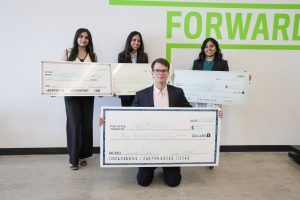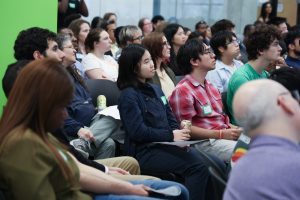
This spring, the Pava Center had a record number of student-led ventures complete its flagship accelerator programs—Kindling, Spark, and Fuel. With over 65 teams participating across all stages of venture development, the Spring 2025 cohorts redefined what’s possible for student entrepreneurship at Johns Hopkins. From the largest Fuel cohort in the program’s history to the first-ever in-person Spark Showcase, this season was packed with firsts, breakthroughs, and bold ideas. More than $100,000 in non-dilutive funding was awarded, and many teams propelled forward by joining the Summer Incubator, receiving Innovation & Entrepreneurship awards, or diving full-time into their ventures post-graduation.
Here are the prize winners for each program.
Kindling Winners
Best Presentation ($350): PrevenTech (James Buchanan, Venkat Ramanan, and Celine Hoh). PrevenTech’s pitch focused on improving patient triage and scheduling to get patients the right care.
Best Problem ($350): Viridare (Katherine Lan, Ramya Sahu, Sasha Wi, and Elizabeth Deng). Viridare’s pitch centered on integrating sustainability into AI infrastructure development.
Best Customer Discovery ($350): M.A.P.S. Biotech: (Matthew Park, Patarajarin Akarapipad, Sasrika Venkatachalapathy, and Anjalika Bandaru). M.A.P.S. Biotech is interested in reducing the failure rate for needle insertion in patients for more efficient procedures.
Spark Winners
The year’s Spark Showcase was brimming with talent, featuring 43 teams this year, prompting the creation of a separate MedTech category due to the high volume of startups in that space. Prizes were awarded based on audience votes. Both MedTech and non-MedTech categories had two winners of $2,000 and two winners of $500.
MedTech
- $2,000 prize winners:
- Dysa.AI, Harsimrat Kaur
Building an AI-powered screening tool that integrates within current health systems and helps clinicians catch cancer earlier. - CerveEase, Azmina Karukappadath
CerveEase is engineering a medical device that enables uterine access while minimizing pain and tissue damage associated with current devices.
- Dysa.AI, Harsimrat Kaur
- $500 prize winners
- SteriBiotics, William Brakewood
SteriBiotics is developing a disinfectant that utilizes probiotic bacteria to kill and prevent the recurrence of antibiotic-resistant pathogens. - CogniPlay, Saakshi Gummaraju
CogniPlay is an app designed to help children with Down syndrome build hand-eye coordination, working memory, and language development through research-backed games.
- SteriBiotics, William Brakewood
Non MedTech
- $2,000 prize winners:
- Vesuvius, Shawn Guo and Brett Wolfinger
Vesuvius is an open-world 2D action platform video game that blends fluid combat with surrealist atmospheric storytelling. - Èdo, Chenfeng Lyu and Shuang Zhu
Èdo is building a Japanese zen culture-inspired specialty café brand, offering Japanese light tea, Japanese style cheesecake, drip bag coffee, and themed tableware.
- Vesuvius, Shawn Guo and Brett Wolfinger
- $500 prize winners
- Dagnam.AI, Angad Sandhu
Dagnam.AI aims to democratize AI by introducing an intuitive no-code tool that transforms complex machine learning development into a drag-and-drop experience. - Sidequests, Bryan Santana and David Benjamin
Sidequests is creating a social fitness and habit-building app that allows users to track workouts or other habits and share their progress with friends.
- Dagnam.AI, Angad Sandhu
Fuel Winners
With ventures tackling everything from pharmaceutical development to neurodiversity support, the Spring 2025 Fuel cohort showcased the depth and diversity of student innovation at Johns Hopkins. Four standout teams earned top honors, each recognized by a different group: judges, the audience, their peers, and the Pava Center team.
- Judge Prize ($15,000) SinuStim (Oriol Cuxart Pérez and Sandhya Tiku) is developing an oral appliance that non-invasively regulates nasal nerves to provide congestion relief.
- Audience Choice ($5,000): Vive (Asher Varon) is constructing a non-electronic, cost-effective, and disposable wearable for the prevention of opioid overdose.
- Cohort Prize ($3,000): Modelus (Mantej Singh and Prem Umang Satyavolu) is building an AI platform to accelerate lead optimization in pharmaceutical development.
- Hustle Prize ($500): DevMinds (Anika Mistry and Anvii Mishra) is creating an AI-driven platform for neurodiversity therapeutic support, providing personalized, accessible learning experiences.
Fuel participants shared reflections that captured the spirit of the program.
“The biggest asset is the network, the cohort and the connections from the Pava Center with the entrepreneurial ecosystem. Even discussions about businesses completely unrelated to your own industry can spark new insights.” – SinuStim team
“Nick Culbertson said that building a startup feels like ‘running backwards through a forest, naked.’ It’s confusing, unpredictable, and even painful at times. But that’s all part of it. Keep collecting data, stay agile, and don’t be afraid to pivot.” – Modelus team
“Embrace the pivoting; it can open up the opportunities you’ve wanted to reach all along.” – Vive team
The Pava Center appreciates the more than a dozen alumni who served as judges for Kindling, Spark, and Fuel. Additionally, all funds awarded are thanks to the generosity of alumni and friends of the Pava Center.

Want to apply?
Applications for the next cohorts of Kindling, Spark, and Fuel will open in early August. These programs are open to all Johns Hopkins students.